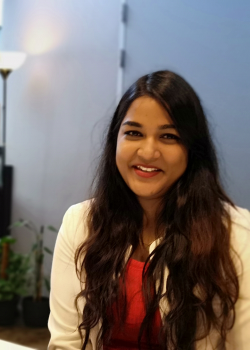Wittenborg Online News!
Student Wants to Change Image of Tea with Research

Sri Lankan Student Wants to Change the Dowdy Image of Tea
Enter Wittenborg student Nirusika Ratnasingam, who did her dissertation on developing a customer engagement model to ensure the sustainability of the tea industry. She also looked at the effectiveness of Tea 2030 – an umbrella organisation representing the sector – which believes tea can be turned into a hero crop by identifying the challenges facing the industry and developing innovative solutions. Nirusika did a case study on the English Tea Shop (UK) Ltd., a fair trade company.
Nirusika herself was born and raised in Sri Lanka – formerly known as Ceylon, which was once the world’s biggest exporter of tea. In fact, tea from Ceylon was so famous that Animal Farm author, George Orwell, mentions it in his 11 rules for making the perfect cup of tea.
Funnily enough, Nirusika says she only started drinking tea after coming to the Netherlands. “Probably because I grew up with everyone around me drinking it, I did not appreciate it. In Sri Lanka people will never think of drinking tea without sugar. Most drink it with milk too. And green tea is only for health nuts.”
With its 5,000 year history, tea is cultivated in 35 countries and consumed daily by 41% of the world’s population. Sri Lanka is now the 4th biggest exporter of tea, and the sector faces huge challenges. Although it is a highly consumed product, it is classified as cheap compared to the high quality of brewed coffee.
Nirusika’s study investigates the effectiveness of customer engagement in the UK and Sri Lankan tea industries. She recommends certain improvements that can be made in terms of customer management, the creation of online communities, brand identity and symbolism. One of her findings on the English Tea Shop was that there has been a high growth in followers of the company on social media and customers’ responses on the company’s website. However, she recommends that the company also engages offline with customers.
“Findings revealed that customers and consumers have a positive perception of the company, and see it as a sustainable company with great ethos and values. They also believe in the authentic provenance of the company and appreciate the brand’s key purpose in building communities from farm to cup”.
Nirusika, who did her internship at Wittenborg University of Applied Sciences, will receive her IBA (Bachelor) degree in Economics and Management diploma at Wittenborg’s 2018 Summer Graduation Ceremony on 13 July.
She plans to do her master's degree in Germany where her husband works, but eventually wants to obtain a PhD and teach. “That is my dream.”
WUP 3/7/2018
by Anesca Smith
©WUAS Press
452 words